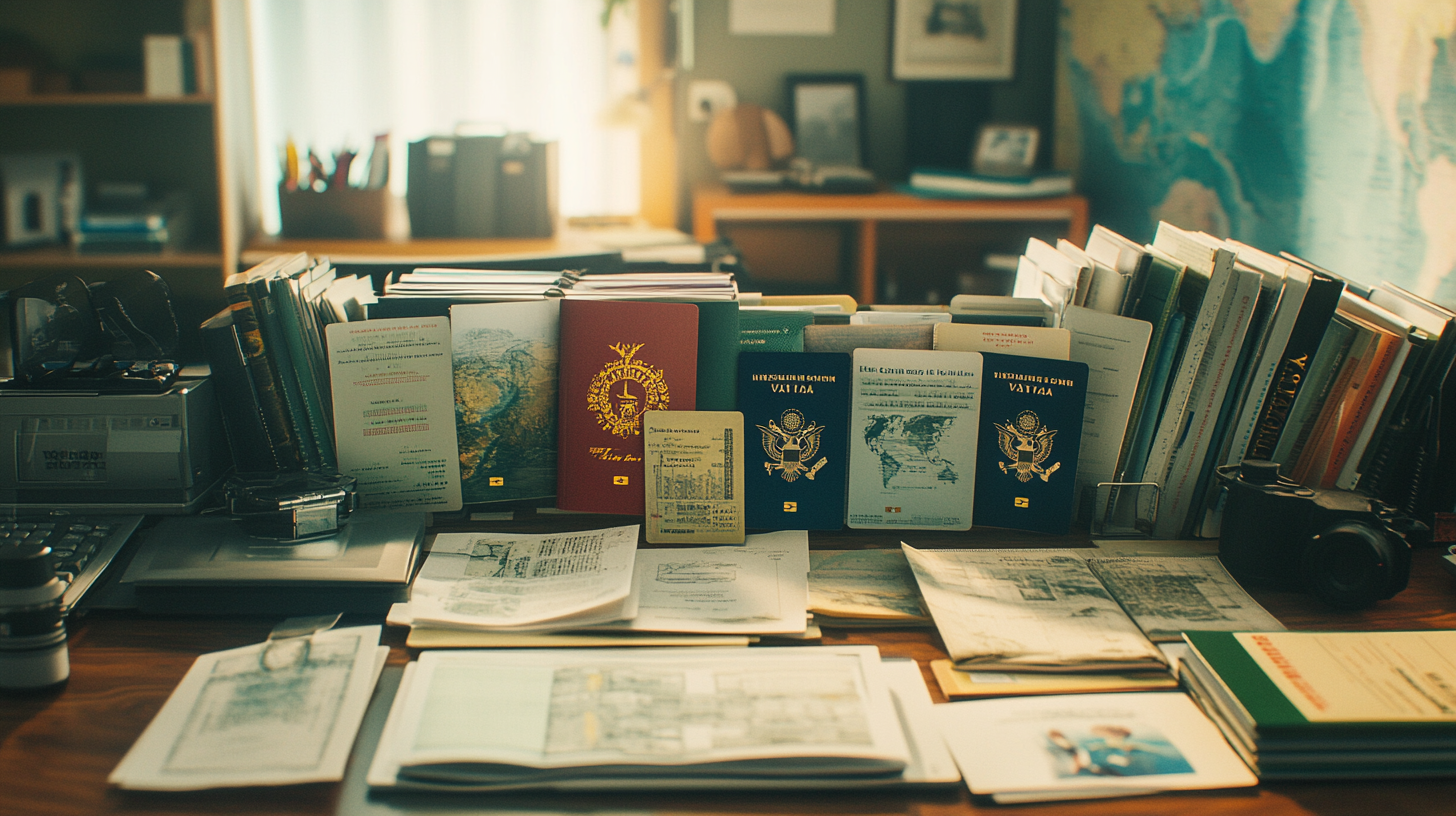Embarking on a New Journey: A Comprehensive Guide to Moving Abroad

Moving to another country is more than just changing your address; it’s about embracing a new culture, lifestyle, and perhaps even a new way of thinking. Imagine waking up to the sounds of a bustling Moroccan market or sipping coffee in a quaint Parisian café. In 2023, it’s estimated that 5.4 million US citizens live abroad, driven by opportunities like job offers, teaching positions, or graduate studies. Whether you’re seeking adventure, career advancement, or a fresh start, relocating internationally can be a life-changing experience. This guide will walk you through the essential steps to ensure a smooth transition to your new home.
1. Deciding Your Destination: Job vs. Location

One of the first decisions you’ll face is whether your priority lies in your job or the location. Many expats emphasize the significance of this choice, as it can shape your entire experience abroad. If your career is paramount, you might focus on countries with booming industries in your field. For instance, tech professionals might consider opportunities in countries like Germany or Japan, known for their innovation and technology sectors. If lifestyle and culture are your main draws, select a place that aligns with your personal interests and values. Perhaps the vibrant art scenes of Italy or the tranquil landscapes of New Zealand appeal to you. Exploring resources like How to Choose the Perfect Country for Your International Move can offer valuable insights to guide your decision.
2. Research Thoroughly

Before packing your bags, invest time in researching potential countries. A thorough understanding of your prospective home can make all the difference in your transition. Consider factors such as:
- Cost of Living: Regions like Southeast Asia offer relative affordability compared to Western Europe. Utilize tools like cost-of-living calculators to compare expenses.
- Job Opportunities: Some countries have higher demand for certain professions. Research industry trends and employment rates in your field.
- Healthcare Access: Understand the local healthcare system and what it would mean for you and your family. Countries with universal healthcare may differ significantly from private systems.
- Schools: If you have children, research international or local schools and their curricula. Consider educational philosophies and language requirements.
- Language: Learning the local language can ease your transition and help you integrate. Resources like Essential Language Skills for Expats Moving Abroad can be invaluable.
Delving deep into these aspects will equip you with the knowledge to make informed decisions and set realistic expectations for your new life abroad.
3. Understand Visa Requirements

Visa processes can be complex and vary significantly between countries. Navigating this legal landscape is crucial for a successful move. Key visa types include:
- Work Permits: Necessary if you’re employed by a company in the new country. Employers often sponsor these, but requirements differ widely.
- Digital Nomad Visas: Ideal for remote workers looking to live abroad. Countries like Estonia and Barbados offer such programs.
- Student Visas: For those pursuing education overseas. Ensure you understand the study obligations and work restrictions attached.
- TEFL Certification: Teaching English as a Foreign Language can open doors in countries like China or Spain. Accredited programs can enhance your eligibility.
Processing times can range from weeks to months, so start early. Gathering documents like criminal background checks or professional certifications may take additional time. For long-term stays, consider consulting legal professionals to navigate the intricacies. Refer to Comprehensive Visa Guide for International Relocation to familiarize yourself with common requirements.
4. Financial Preparation

Relocating requires solid financial planning to ensure stability and peace of mind:
- Save Adequately: Aim to have at least six months’ worth of expenses saved. This cushion can safeguard against unexpected costs.
- Banking: Set up a travel-friendly bank account to avoid international fees. Some banks offer accounts specifically designed for expats.
- Budgeting: Account for expenses like visa fees, international health insurance, and moving costs. Creating a detailed budget can prevent oversights.
Remember, while moving can potentially boost your earnings by up to 51%, initial expenses can be significant. Utilize financial planning resources like Financial Planning Checklist for Moving Abroad to organize your finances effectively.
5. Secure Accommodation

Before arrival, arranging your living situation can provide a sense of security and comfort:
- Rental Agencies: They can help find accommodations suited to your needs. Agencies familiar with expats can navigate language barriers and legal requirements.
- Purchasing Property: If you’re looking to buy, engage a reputable realtor familiar with expatriates. Be aware of property laws and taxes for foreign buyers.
- Temporary Housing: Consider short-term rentals or extended-stay hotels for flexibility. This option allows you to explore neighborhoods before settling.
Utilizing platforms that specialize in international housing or reading Guide to Finding Accommodation When Moving Abroad can streamline this process.
6. Handle Logistics of Belongings

Deciding what to do with your possessions is a significant aspect of your move:
- Shipping: Obtain quotes for containers or air freight based on your budget and timelines. Factor in customs duties and import regulations.
- Minimize: Sell or donate items to reduce moving costs. Embracing a minimalist approach can simplify your transition.
- Storage: Consider storing items in your home country if the move is temporary. This option keeps sentimental items safe until your return.
Researching International Moving and Shipping Options Explained can help you choose the best method for transporting your belongings.
7. Health Care Considerations

Healthcare systems differ globally, so it’s vital to prepare accordingly:
- Medical Insurance: Secure overseas medical insurance before your departure. Ensure the policy covers you in your new country and during travel.
- Immunizations: Get necessary vaccinations as per the destination country’s requirements. Consult with a travel clinic well in advance.
- Local Healthcare System: Familiarize yourself with how to access medical services in your new country. Understand the difference between public and private care options.
Planning ahead by reviewing Navigating Healthcare Systems Abroad: A Guide for Expats can alleviate potential health-related stresses.
8. Legalities and Documentation

Ensuring all your documentation is in order is essential for a seamless move:
- Passport: Update it if it’s close to expiring. Many countries require passports to be valid for at least six months beyond your stay.
- Visas and Travel Authorizations: Obtain necessary documents like ETIAS for Schengen countries. Keep physical and digital copies accessible.
- Vital Documents: Make copies of birth certificates, marriage licenses, and other important papers. Notarized translations may be required.
Organizing these documents early and consulting Essential Legal Documents for Moving Abroad can prevent last-minute complications.
9. Family and Pets Logistics

If moving with family or pets, additional considerations are necessary:
- Schools: Research and apply to schools if you have children. Look into application deadlines and required documentation.
- Pet Import Laws: Comply with regulations to avoid quarantine or denial of entry for your pets. This may include vaccinations, microchipping, and health certificates.
Resources like Moving Abroad with Family and Pets: What You Need to Know can provide detailed guidance on these topics.
10. Stay Organized with a Checklist

An expat checklist can simplify the process and keep you on track:
- Timeline Management: Break down tasks into manageable steps and prioritize high-impact items. Set realistic deadlines for each.
- Documentation: Keep track of all necessary paperwork and deadlines. Use digital tools or apps for reminders.
- Settling Affairs: Arrange for utility shutdowns, sell or ship vehicles, and set up mail forwarding. Don’t forget to notify banks and other institutions of your move.
Treat your move like a project plan to keep stress levels low and ensure nothing is overlooked. Downloading The Ultimate Moving Abroad Checklist can provide a comprehensive template to follow.
Final Thoughts

Moving abroad is undoubtedly a significant undertaking, but with meticulous planning and the right resources, it can be a rewarding and life-enhancing experience. By following this comprehensive guide, you’ll be well on your way to starting your new adventure with confidence and excitement. Remember, flexibility and thorough preparation are your best allies in this journey. Embrace the challenges and look forward to the countless opportunities that await you in your new home.
Follow us back to Seat 5A for more insights and tips on making your international move a success.






